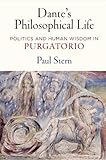Dante's Philosophical Life : Politics and Human Wisdom in "Purgatorio" / Paul Stern.
Material type: TextPublisher: Philadelphia : University of Pennsylvania Press, [2018]Copyright date: ©2018Description: 1 online resource (304 p.)Content type:
TextPublisher: Philadelphia : University of Pennsylvania Press, [2018]Copyright date: ©2018Description: 1 online resource (304 p.)Content type: - 9780812295016
- 851/.1 23
- PQ4448
- online - DeGruyter
| Item type | Current library | Call number | URL | Status | Notes | Barcode | |
|---|---|---|---|---|---|---|---|
 eBook
eBook
|
Biblioteca "Angelicum" Pont. Univ. S.Tommaso d'Aquino Nuvola online | online - DeGruyter (Browse shelf(Opens below)) | Online access | Not for loan (Accesso limitato) | Accesso per gli utenti autorizzati / Access for authorized users | (dgr)9780812295016 |
Browsing Biblioteca "Angelicum" Pont. Univ. S.Tommaso d'Aquino shelves, Shelving location: Nuvola online Close shelf browser (Hides shelf browser)

|

|

|

|

|

|

|
||
| online - DeGruyter Communists and Their Victims : The Quest for Justice in the Czech Republic / | online - DeGruyter Before AIDS : Gay Health Politics in the 197s / | online - DeGruyter "Sefer Hasidim" and the Ashkenazic Book in Medieval Europe / | online - DeGruyter Dante's Philosophical Life : Politics and Human Wisdom in "Purgatorio" / | online - DeGruyter Why Terrorist Groups Form International Alliances / | online - DeGruyter Feeling Time : Duration, the Novel, and Eighteenth-Century Sensibility / | online - DeGruyter Military Cultures in Peace and Stability Operations : Afghanistan and Lebanon / |
Frontmatter -- Contents -- Chapter 1. Politics, Poetry, and Philosophy in Purgatorio -- Chapter 2. “What Good Would Climbing Do?”: The Rationale and Impetus for the Pursuit of Self- Knowledge (Cantos I–IX) -- Chapter 3. “To a Better Nature You Lie Subject”: The Political Character of Humanity and Nature (Cantos X–XVII) -- Chapter 4. Disrobing the Siren: The Zealous Pursuit of Clarity (Cantos XVII–XIX) -- Chapter 5. “When Love Breathes Within Me”: The Desirability of Desire (Cantos XIX–XXVII) -- Chapter 6. “The Nest for Human Nature”: Earthly Paradise and the “Happiness in This Life” (Cantos XXVIII–XXXIII) -- Chapter 7. Dante’s Human Wisdom -- Notes -- Index -- Acknowledgments
restricted access online access with authorization star
http://purl.org/coar/access_right/c_16ec
When political theorists teach the history of political philosophy, they typically skip from the ancient Greeks and Cicero to Augustine in the fifth century and Thomas Aquinas in the thirteenth, and then on to the origins of modernity with Machiavelli and beyond. Paul Stern aims to change this settled narrative and makes a powerful case for treating Dante Alighieri, arguably the greatest poet of medieval Christendom, as a political philosopher of the first rank.In Dante's Philosophical Life, Stern argues that Purgatorio's depiction of the ascent to Earthly Paradise, that is, the summit of Mount Purgatory, was intended to give instruction on how to live the philosophic life, understood in its classical form as "love of wisdom." As an object of love, however, wisdom must be sought by the human soul, rather than possessed. But before the search can be undertaken, the soul needs to consider from where it begins: its nature and its good. In Stern's interpretation of Purgatorio, Dante's intense concern for political life follows from this need, for it is law that supplies the notions of good that shape the soul's understanding and it is law, especially its limits, that provides the most evident display of the soul's enduring hopes.According to Stern, Dante places inquiry regarding human nature and its good at the heart of philosophic investigation, thereby rehabilitating the highest form of reasoned judgment or prudence. Philosophy thus understood is neither a body of doctrines easily situated in a Christian framework nor a set of intellectual tools best used for predetermined theological ends, but a way of life. Stern's claim that Dante was arguing for prudence against dogmatisms of every kind addresses a question of contemporary concern: whether reason can guide a life.
Mode of access: Internet via World Wide Web.
In English.
Description based on online resource; title from PDF title page (publisher's Web site, viewed 04. Okt 2022)


